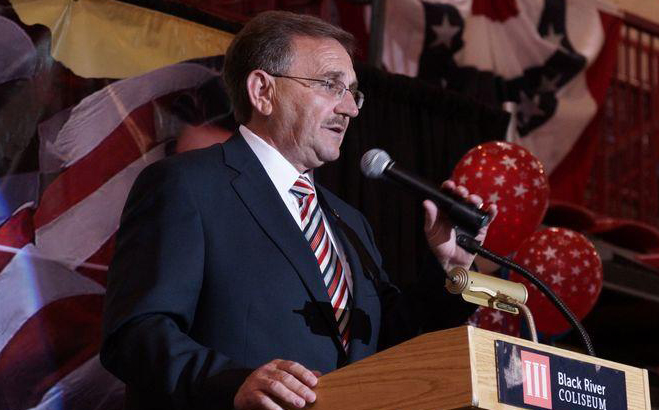The end of the legislative session brings with it the resting place of individual bills and issues that will fail to become law in 2016. Here we have highlighted six such bills that found their final resting place in the Missouri Legislature May 13, 2016.
Bill: HB 1891 – Paycheck Protection
Fate: Governor’s veto sustained*
Why it failed: Perhaps the most important piece of legislation to both sides of the aisle heading into the final week of session, everyone expected a nonstop filibuster from Senate Democrats that would essentially shut down the session if paycheck protection came up for debate. Senate supporters of the bill scrambled to flip Sen. Paul Wieland, and attempt to shore up support among the other more union-friendly Democrats. Meanwhile, the Democrats worked to entice Sen. Maria Chappelle-Nadal who has had a rocky relationship with organized labor in the past few years.
When the bill came up for a vote Thursday night, Democrats only spoke on the proposition for roughly four hours before stopping debate to allow a vote. Despite Wieland flipping his vote, Chappelle-Nadal supported the measure after remaining silent during the first roll call, labor supporters in the Senate (the Democrats, as well as Republican senators Ryan Silvey and Gary Romine) stood firm and struck a second big blow against the anti-labor crowd in as many years.

Bill: SB 623 – Gas Tax Bill
Fate: Stalled in the House
Why it failed: As a rule of thumb, Republicans generally hate any kind of a tax increase, but upon first glance the gas tax seemed different than other ways to grow revenue. Failing infrastructure is perceived and recognized by many in the Capitol, and Sen. Doug Libla’s bill would raise funds only to directly address that problem. SB 623 received a hearing early in the legislative session, but it was placed on the calendar a full month after it was reported out of committee and was third read and passed a month after that in April.
By the time it reached the House, the bill had undergone some changes, and it went through the House Transportation Committee and the Select Committee on State and Local Government before finally getting on the House calendar… on May 13. The legislative process itself seemed to be the main culprit for its slow movement through both chambers, but there were rumors leadership was not keen on passing a tax increase, especially during an election season.
Bill: HB 2369 – Energy Bill
Fate: Blocked by Senate filibuster
Why it failed: Rep. Rocky Miller’s comprehensive energy bill had quite a few components, and while it had its opponents in the House, some in the Senate took enough exception to the bill that they filibustered the legislation. When Senate handler Sen. Ryan Silvey laid it on the informal calendar May 3, it never came before the body again.
Sen. Gary Romine and Sen. Rob Schaaf spearheaded the effort to defeat the legislation because they interpreted a part of the bill as giving electric utility companies near or total unilateral control to set their own rates, regardless of oversight from the Public Service Commission. Silvey and Miller disagreed with that assessment, insisting that it would simply remove regulatory lag and save consumers money in the long run. Romine, Schaaf and their coalition defeated the bill.
Another bit of language would have created easier ratemaking negotiation for aluminum smelters and electric companies. The failure of the bill added lemon juice to the already salted wound Southeast Missouri suffered after Noranda announced its bankruptcy.

Bill: HB 1892 – Prescription Drug Monitoring Program
Fate: Blocked by Senate filibuster
Why it failed: To put it succinctly, Sen. Rob Schaaf.
Schaaf argued in a short filibuster that the proponents of the PDMP bill were actually the cause of its failure because they refused to compromise with him on a referendum clause. Despite his own analysis, Schaaf has blocked this legislation when it has reached the Senate for years. When US Sen. Claire McCaskill was in Jefferson City to address opioid abuse in January, she said “I know if I waved a magic wand and locked a certain senator in a closet, we could get this done,”
Alas, Rep. Holly Rehder saw two of her largest pieces of legislation fall in the Senate (she also sponsored the paycheck protection bill). Despite largely bipartisan agreement on the measure, the bill has also begun getting a larger share of detractors in the Capitol, especially among the more libertarian-inclined crowd, who are leery a PDMP will result in more government interference, privacy concerns, and a program that simply does not solve the prescription opiate crisis it is trying to treat.
Bill: HB 2166 – Lobbyist gift ban
Fate: Stalled in the Senate
Why it failed: Even though Sen. Dave Schatz’ amendment to allow for meals up to $40 dollars made it onto the bill, the reason this legislation failed is arguably because of the language that did not get on the final bill. When Sen. David Pearce moved to place language that would institute campaign contribution limits to HB 2166 and shed light on donations from 501(c)(4)s, it snowballed into further discussion that stopped the bill in its tracks. Debate on a further amendment from Sen. Ryan Silvey stalled the proceedings long enough that Onder withdrew the bill.
Rep. Justin Alferman badly wanted to pass the lobbyist gift ban, which was seen as perhaps the most impactful of the ethics reform legislation that travelled through the Capitol. When the situation in the Senate looked grim, Alferman began attaching the language to almost any bill he could without breaking House rules. However, none of those bills made it to the governor’s desk.
Bill: HB 2330 – Uber bill
Fate: Stalled in both the House and the Senate
Why it failed: Uber has become notorious in Missouri for its lack of willingness to compromise on efforts to regulate what is still seen by many as a new concept. The ride sharing company came into conflict with St. Louis last year over regulatory oversight before finally just starting service on their terms and apparently daring St. Louis to respond.
In the legislature this year, however, they did seem willing to compromise on certain regulations, but they put their foot down on fingerprint background checks on their drivers done by the FBI. Concerns of safety regarding drivers led some to amend the bill to require fingerprint background checks for Uber drivers. Another proposed amendment would have exempted Kansas City from the new regulations, to assuage the concerns of some Kansas City representatives. Sen. Joe Keaveny said that if the latter language had made it onto the bill he would have filibustered it.
Updated 10:10 a.m., May 18, 2016: A previous version of the story erroneously reported that Gov. Jay Nixon’s veto of HB 1891 was overridden when it was actually sustained.

















